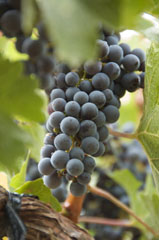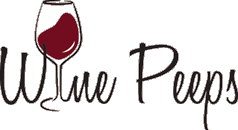Don’t Forget that Wine Grapes are Fruit
By John ~ September 10th, 2010.
 After more than fifty years since my first sip of wine, I have a pretty good idea of what I like in a wine and what I don’t like…and what’s good and what is not really good. And I’m not easily fooled by a wine whose proponents call it a product of unique terroir when, in my educated opinion, it is basically a flawed wine. There is no purely objective answer to the question of what is the best wine.
After more than fifty years since my first sip of wine, I have a pretty good idea of what I like in a wine and what I don’t like…and what’s good and what is not really good. And I’m not easily fooled by a wine whose proponents call it a product of unique terroir when, in my educated opinion, it is basically a flawed wine. There is no purely objective answer to the question of what is the best wine.
“…wine is a little bit like music or art. What you and I like may be two completely different things, but at the end of the day neither one of us is right—we just have different tastes.†–Matt Skinner, Thirsty Work
“There can never be a substitute for your own palate, nor any better education than tasting the wine yourself.†–Robert Parker, world-renowned wine critic
As far as my tastes go, as I said up front in the title of this post, I keep in mind that wine grapes are fruit. So if I don’t smell and taste good fruit up front, it is unlikely that I’m going to rate that wine very highly. Now, before you flood the comments criticizing me, let me clarify that I’m not saying a wine has to be a fruit bomb. In fact, I’d rather it not be too jammy. I enjoy other aromas and flavors and can even appreciate a little “funk,†but I’ve got to be able to taste the fruit as well. I’ve learned in the thirteen years that I’ve lived in Washington State and frequented Washington wine country that intense fruit is a defining characteristic of Washington wines.
“Those new to Washington wines will discover that the baseline wine flavors of all these regions [in Washington] are built on vivid fruit, bright acids, and ripe, compact tannins. The defining character is intensity married to purity of varietal fruit.†–Paul Gregutt, Washington Wines and Wineries, Second Edition
So if someone is touting a wine to you that reeks of rotten garbage or a dirty locker room smell, be sure to ask yourself, do I want to like this wine because it is “supposed†to be good according to some expert, because it has developed a cult following through great marketing, or because of a high price tag? As far as I’m concerned, none of those are good reasons to believe you need to like a certain wine.
If you’re not sure whether you really like a wine or just think you are “supposed†to like the wine, put the wine in a blind tasting with a number of its peers and see how it stacks up. A blind tasting means that sacks or wine bags cover the bottles so that the labels cannot be seen. Typically, a number of wines of a single type (i.e. Washington Cabs) are tasted and compared, and then their identities are revealed. By tasting wines blind, you are not influenced by the label, the reputation of the winemaker, or the price. You are focused totally on the quality of the wine and are completely unbiased in your evaluation. After you have evaluated the wines, the real fun begins, which is removing the bags or sacks that have covered the bottles and discovering the identities and prices of wines that you really like (or don’t like).
For those of you who are not familiar with how to spot some of the common wine faults, here’s a brief primer:
- Brettanomyces – mousy or yeasty
- Mercaptans – garlic or onion-like odors
- Sulfur dioxide (SO2) – burnt matches smell
- Hydrogen sulfide (H2S) – rotten eggs
- Volatile acidity – rancid butter, sauerkraut, vinegar, or fingernail polish remover
Don’t let anyone pass off wines with any of these characteristics as simply wines from a unique terroir. Always remember, wine grapes are fruit.
Cheers!
Filed under: General Wine Information

 Wine Peeps is an independent wine blog dedicated to helping you get the most bang for your buck in wine. We do this through blind tastings of wine from around the world and calculations of
Wine Peeps is an independent wine blog dedicated to helping you get the most bang for your buck in wine. We do this through blind tastings of wine from around the world and calculations of 











John, It was good to list the faults that wine consumers should be made aware of. I am curious though – you wrote:
So if someone is touting a Washington wine to you that reeks of rotten garbage or a dirty locker room smell …
Just Washington wines? I cannot ever remember tasting a faulty Washington wine, but I am sure they are out there. However, I have noticed it more with wines out of Washington and especially outside of North America. Is there is a specific WA wine smelling more than just funk? Do tell. Give us a QPR. A hint?
Signed,
Don’t Mind a Little Brett
Good catch, Catie. I didn’t intend to be referring only to Washington wines. And, you are correct that I’ve found found many more of the those kind of wines outside of Washington than in Washington. But the purpose of this post is not to name names, just identify faults.
Sending on to my brother as we just had this conversation last night as he opened a tainted bottle.
Jenny,
Remind your brother than he can subscribe and receive our posts automatically if he likes them.
I enjoyed reading your article. Unfortunately in my country, there seems no one yet has the guts to speak against wine snobs. Well, it is a growing market and people are being educated, though.
Thanks for your kind words, Vicky.
Excellent post and very informative as well! I even learned a few things that I did not know!
I would also add that you are so right about someone touting a wine that is in fact flawed. The same can be said for a wine that a certain NYC based national publication reviewed and gave it the kiss of death score of 87 (that wine will be harder to sell retail now). Anyhow, point being I tried that wine and was blown away for the quality and pedigree for the price point!
Like you said John, know what you like and don’t let anybody tell you otherwise!
Brian,
Thanks, as always, for your comments. You hit the nail on the head.